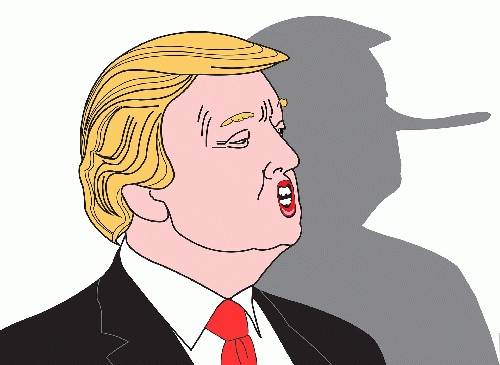Donald Trump, the nominee of the Republican Party for President of the United States in the 2016 elections, is a controversial figure. He has said many things that you would consider as impossible to hear from a candidate if you were asked. But Trump keeps going on, throwing away whatever comes to his mind about any subject.
His statements about Middle-East people, especially those converted or born as Muslims, have been a source of sharp criticism, but also of unsurprising support from some groups in the United States. Actually, it is sometimes kind of hard to know whom he is talking about as he tends to put all ethnicities in the same basket, and call everybody from Middle-East region "Arabs", for instance.
What Trump has been treating to do if he becomes President
Regarding "Arabs", Donald Trump has said that no Muslim person will be allowed to enter the United States if he becomes President. He got to the point of proposing a religion test of some kind to ensure that people wouldn't lie about it.
He has also affirmed several times that he will halt all purchases of oil from Saudi Arabia and other allies in the region if they don't give free-pass and troops to the U.S. to fight their enemies in their territory. As an alternative, these countries could also reimburse the United States for their military services so far.
What have been the consequences to his words so far
Of course, except for those who have something personal against Muslim people, the world came to a shock after hearing it. And the consequences were both political and economical to him.
Trump Home products, his lifestyle portfolio and reviews of companies were banned from several shops in the United Arab Emirates, Kuwait, Saudi Arabia, and Qatar, including major chains. Other companies that do business with Trump are having to explain why they are still doing it as public opinion isn't happy with it.
Even inside his own party, his ideas weren't very welcomed. The House Speaker Paul Ryan and the Republican National Committee Chairman Reince Priebus both condemned his proposal for a Muslim ban, saying that it would be a violation of the Constitution.
Another consequence of his words - but not only because of it, of course - has been the increased surge in citizenship interest among immigrants. Many people are afraid of losing their job, being expelled from colleges and sent back home or that their lives will become unbearable if Trump is elected, so they are rushing to the immigration offices wishing to accelerate the process to the best they can.
It is not all about "Arabs" and Muslims
If it works as a consolation, Trump doesn't open his mouth just against "Arabs" and Muslim people. He has been at the center of many other xenophobic and racist moments throughout his campaign.
Trump has accused all Mexican people of being drug dealers and rapists; used Ted Cruz's Cuban ancestry as a way to discredit him; said that the two men that beat up a homeless Latino on his name were just "passionate". He was also sued twice in the 70s by the Justice Department, accused of not renting for black people.
On his "resume", there are also racist comments against Asian Americans, misogynist jokes, and mocking a physically challenged journalist from The New York Times. So, at least, nobody can say that his thoughts aren't consistent.
Why does he do it?
(Note: You can view every article as one long page if you sign up as an Advocate Member, or higher).





